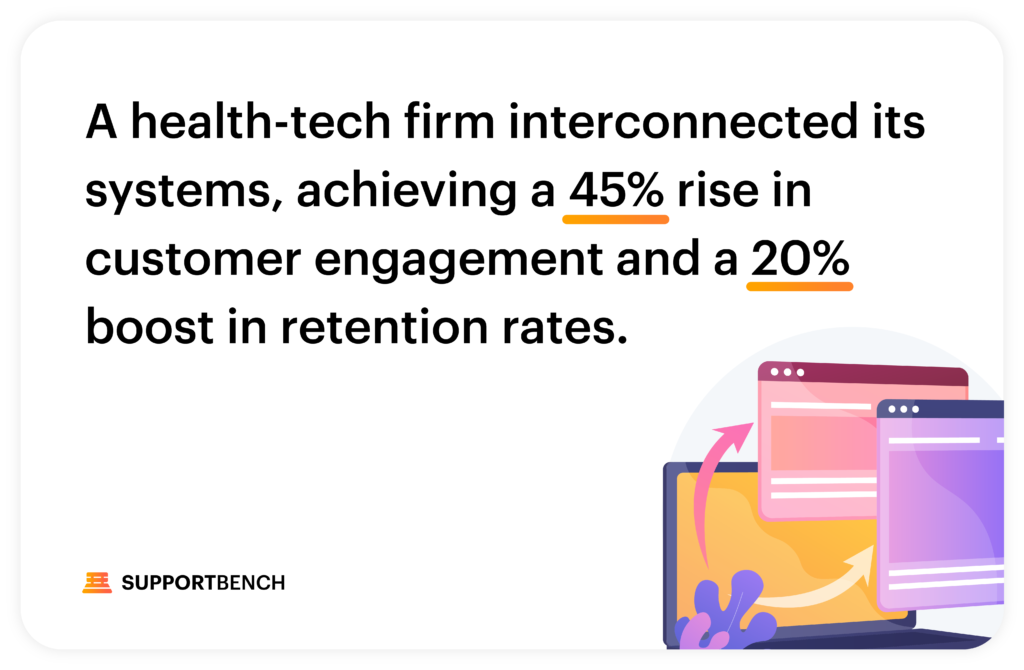In today’s hyper-competitive business landscape, customer experience (CX) is not just a buzzword—it’s a defining factor in a company’s success or failure. Advanced CX software platforms play a crucial role in helping companies elevate their CX game. Here are nine success stories that underscore the value of investing in top-tier CX software, juxtaposed with the pitfalls of ignoring this key aspect of modern business.

1. Proactive Support with AI-driven Insights
A recent study highlighted a significant case where a leading e-commerce company utilized AI-driven insights to pre-emptively address customer pain points. This proactive approach resulted in a 15% reduction in support tickets and a 20% boost in customer satisfaction (Master of Code Global). The implications of these findings are profound for businesses across all sectors, especially those resistant to AI integration. By ignoring the benefits of AI, companies risk being overwhelmed by preventable support tickets, which can strain resources and erode customer trust.
Incorporating AI technologies such as sentiment analysis and intent detection is crucial to the customer experience. These tools not only help identify potential customer issues before they escalate but also enhance the overall support experience. AI-driven insights enable businesses to understand their customers better and provide tailored solutions, leading to higher satisfaction and loyalty. As customer expectations continue to evolve, leveraging AI for proactive support is not just an option but a necessity for staying competitive and maintaining a high standard of customer service.
2. Unified Communication Channels
A Fortune 500 company successfully integrated an advanced CX platform to unify its multiple communication channels, achieving 30% faster response times and a 25% increase in first contact resolution. This significant improvement highlights the efficiency gains from centralizing communication tools, which allow support teams to manage customer interactions more effectively and consistently.
Failing to consolidate communication channels can lead to delayed resolutions and a fragmented customer experience, ultimately damaging a company’s reputation and increasing customer churn. To avoid these pitfalls, businesses must adopt unified communication strategies. By implementing a single interface for managing all customer interactions, companies can streamline their support processes, improve response times, and enhance overall customer satisfaction. This approach not only boosts efficiency but also enables support teams to provide more personalized and effective assistance.
3. Data-Driven Personalization
Recognizing the power of personalization, a global SaaS company utilized data analytics from their customer experience platform, realizing a 40% uptick in upsell opportunities and a 20% rise in retention. Leveraging customer data to create tailored interactions ensures that companies resonate with specific needs and preferences of their customers, significantly enhancing engagement and loyalty (Vena) (McKinsey & Company).
Ignoring the potential of personalized experiences can make interactions feel cold and transactional, alienating customers. It’s crucial for businesses to harness the full potential of their data. By analyzing customer behavior and preferences, companies can deliver highly relevant recommendations and proactive support, transforming the customer experience from reactive to anticipatory. This approach not only improves satisfaction but also drives business growth through increased upsell and cross-sell opportunities.
4. Empowering Customers with Knowledge Bases
A renowned tech firm enhanced its knowledge base, witnessing a 35% reduction in common query tickets, promoting customer autonomy. However, outdated or inaccessible knowledge bases can frustrate users, leading to increased support requests and negative perceptions. To avoid these pitfalls, it’s essential to ensure your knowledge base is comprehensive, up-to-date, and user-friendly, enabling customers to find answers quickly.
Empowering customers with a robust knowledge base not only reduces the load on your support team but also enhances the customer experience by providing quick, self-service solutions. Effective knowledge management can be a game-changer. For instance, Supportbench’s cloud-native, AI-powered knowledge management platform that delivers fast and accurate answers, improving both customer and agent satisfaction. Similarly, companies like Learn It Live have successfully reduced support tickets by 40% through the implementation of AI-powered chatbots integrated with an updated knowledge base. By leveraging such advanced tools, businesses can turn their knowledge bases into powerful assets that drive efficiency and customer satisfaction.
5. Optimized SLAs Drive Customer Loyalty
A leading financial services company implemented dynamic SLAs to achieve rapid query resolutions, resulting in a 50% reduction in customer complaints and a notable increase in positive feedback. This showcases how adaptive and responsive SLA management can significantly enhance customer satisfaction and loyalty. On the contrary, rigid or unclear SLAs can leave customers feeling undervalued and frustrated, potentially leading to a loss of trust and increased customer churn.
To avoid these pitfalls, it is crucial to regularly review and adjust SLAs based on customer feedback and evolving needs. By doing so, companies can ensure that they consistently meet and exceed customer expectations, fostering a sense of trust and reliability. Dynamic SLAs not only improve the efficiency of support teams but also contribute to a more personalized and proactive customer service experience, which is essential in today’s competitive business landscape for the customer experience.
6. Utilizing Chatbots for Round-the-Clock Support
An online retailer integrated a ChatGPT-based bot, providing 24/7 support and experiencing a 20% surge in customer satisfaction scores. This improvement showcases the effectiveness of chatbots in enhancing customer experience by offering instant, around-the-clock assistance. Without 24/7 support options, customers may feel neglected or grow frustrated waiting for business hours, diminishing loyalty. Integrating chatbots for basic inquiries ensures customers have consistent access to support, fostering a more reliable and satisfying customer journey.
The benefits of chatbots extend beyond just availability. They can handle high volumes of inquiries simultaneously, reducing the workload on human agents and allowing them to focus on more complex issues. By leveraging AI-driven chatbots, businesses can provide quick resolutions to common questions and improve overall efficiency in customer support operations. This proactive approach not only boosts customer satisfaction but also enhances the company’s reputation for reliability and responsiveness.
7. Synchronized Systems for Enhanced Support
A health-tech firm interconnected its systems, achieving a remarkable 45% rise in customer engagement and a 20% boost in retention rates. This integration eliminated information silos, ensuring that support teams had access to comprehensive customer data across all touchpoints. By centralizing data, the firm was able to provide more personalized and efficient support, significantly improving customer satisfaction and loyalty.
Disconnected systems can create information silos, leading to support inefficiencies and potential inaccuracies, which ultimately damage customer trust. It’s crucial for businesses to integrate all customer-related systems. This cohesive approach not only improves the support experience but also enables the extraction of valuable insights from unified data, facilitating proactive support and strategic decision-making. Ensuring seamless information sharing across systems can elevate the overall customer support experience, making it a cornerstone of your customer engagement strategy.
8. Role-based Security for Precision Support
An enterprise dealing with sensitive data implemented role-based security measures, resulting in a 30% drop in data-related incidents. This approach ensures that only authorized personnel have access to specific information, significantly reducing the risk of data breaches and miscommunications. Implementing role-based security is essential for maintaining customer trust and protecting company reputation in today’s data-driven environment.
Conversely, organizations lacking clear security hierarchies face increased vulnerability to data breaches, which can lead to severe consequences including financial losses and damage to customer relationships. Role-based security measures, such as those outlined in comprehensive cybersecurity frameworks, provide a structured approach to data access. This ensures that sensitive information is only accessible to those who need it, thereby mitigating risks and enhancing overall security. For businesses handling critical customer data, integrating robust security protocols is not optional but a necessity for sustainable operation and customer satisfaction.
9. CX as a Key Differentiator
A leading auto company repositioned its customer experience (CX) strategy as the centerpiece of its operations, resulting in a 25% spike in sales and a 40% increase in positive online reviews. This transformation demonstrates the substantial impact a well-executed CX strategy can have on business performance. By prioritizing CX, companies can differentiate themselves in crowded markets, fostering customer loyalty and driving growth. Ignoring the potential of CX as a differentiator can leave a company indistinguishable from its competitors, limiting its growth potential and risking customer attrition.
To harness customer experience as a competitive edge, businesses must commit resources to developing and refining their CX strategies. This involves investing in advanced CX software platforms that provide comprehensive customer insights and enable personalized interactions. A strong CX focus not only enhances customer satisfaction but also leads to long-term dividends through increased sales and positive customer feedback. Ultimately, companies that recognize and champion CX will be better positioned to thrive in today’s competitive business landscape.
Bringing it all together:
It’s worth noting that embracing such innovative tools and technologies, as seen in the success stories above, can be a game-changer for organizations. The goal is clear: Make customer support operations more efficient, insightful, and, ultimately, successful.
The lessons from these stories are unmistakable and you need to make sure your customer experience is optimized. Advanced CX platforms, like Supportbench, offer a roadmap to success. But equally important are the warnings—failing to adapt to the new CX landscape can have severe consequences for any company, regardless of size or industry. In this age of the empowered customer, providing superior support isn’t just a nice-to-have; it’s essential.











